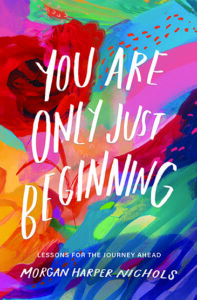There’s a full chapter in Instagram artist and poet Morgan Harper Nichols’ new book, You Are Only Just Beginning, dedicated entirely to elephants. Yes, elephants.
The immensely popular 34-year-old artist has garnered nearly two-million followers on Instagram over the past six years by sharing colorful, abstract paintings with short messages of hope, joy, encouragement and honesty. “You are not out of time, and there is still room for you to explore what it means to unfold into your bloom,” reads one post from last December. The words float and curve over a landscape of greens and blues and green-blues, with a flower whose petals are drifting into the sky.
Nichols’ Instagram success has bloomed into a full-time endeavor, and she and her husband, Patrick, run an online shop together called Garden24, where fans can buy her art pieces. But it’s her third book, released in February, in which her audience might be surprised (and delighted) to find her homage to the pachyderm.
“It wasn’t even a marketing decision. I just love elephants,” Nichols said in an interview for Common Good. In fact, the chapter is the hard-won fruit of a season of self-discovery.
Nichols’ perception of both herself and her work changed in 2021, when she was formally diagnosed with autism. Upon learning about her diagnosis, she said she felt both relief and the license to structure her life in a new, more forgiving way. She saw that it was her autism, not ‘weakness,’ which made everyday tasks, like going to the post office or answering a phone call, deeply anxiety-producing. Now she knew she didn’t need to be so hard on herself for feeling exhausted by the pressure to be socially “on” all the time.
Before her diagnosis, Nichols felt pressure to approach her creative habits with strategy and discipline instead of freedom and calm. She’d sit down to paint and immediately begin fretting over which collection that particular piece would belong to, what the social media analytics would or wouldn’t be, how many afternoons she could afford to follow her curiosity and mix new colors or try something new.
But Nichols’ autism has introduced her to a new version of herself: someone who needs the space to simply create what she loves, and to breathe while she does it. Thus, a chapter of her new book dedicated to her favorite zoo animal.
“I found a great degree of comfort in the ways in which they have their own communication style,” Nichols said. Elephants talk to each other in low rumbles, called infrasounds. For Nichols, this was a profound reminder that there are many ways to communicate — and that looking for something slower and lower in our fast-paced digital age might be countercultural, but that doesn’t make it “wrong.” It was a lesson from an unlikely source, but one she saw fitting serendipitously into a book full of illustrated essays, poems, and reflections on life’s difficulties.
You Are Only Just Beginning: Lessons for the Journey Ahead
In this book, as a new version of herself, Nichols sees her art in a new light, too. Like many autism sufferers, Nichols has found that using her body and her senses has a profoundly calming effect on her often-racing thoughts. She’s on to something here: research suggests that doing something creative, like painting, releases dopamine in the brain, which can relieve anxiety, depression, and stress. “The physical activity of painting is so soothing for me,” Nichols said. “The physical activity of being able to look at colors … and make colors out of several colors together — that is something that I love to do that helps me just breathe.”
Her finished products — the soft lines, the swirling colors, the encouraging words — accomplish the same thing for her audience.
Though unmistakably sincere, Nichols’ art has still received a long e-mail or two (or 12) criticizing her work for not being more “overtly” Christian. You won’t find many Bible verses in her paintings. But Nichols said she wants her art to feel true in a moment; not to tell the whole story of God’s world in one Instagram post. “Art is a place that accepts the complex human experiences,” she said. In other words, if the “earth is the Lord’s and everything in it,” (Ps 24:1), then everything beautiful points directly to him, even if it doesn’t call him by name.
Nichols, a Christian who grew up the child of a preacher, has a favorite quote about the purpose of art. It comes from Sister Whitney Beckett, the late Catholic nun and art historian, who wrote that the purpose of art is to accept “all the sadness and transform it, implicitly affirming that beauty is essentially the presence of God.”
Finding that beauty can be difficult in a culture that’s struggling to talk to each other. “Every comments section on any platform, about anything, is filled with arguments and debates about what color the sky is,” Nichols said. But if art is unfalsifiable — if we paint that sky pink or mauve or coral, and each is valid, because these are the colors we chose — then we’ve escaped the argument; even if just for a moment. Nichols said her art isn’t going to “solve” the problems of the internet. Her art doesn’t have to speak to everybody all at once. But, she said, it should be accessible to anybody.
Whether it’s a poem reflecting a personal story a follower has shared with her or a chapter dedicated entirely to elephants, Nichols hopes her new book and her continued online presence continues to prompt her followers to stop their scrolling — and worrying and hurrying — and just breathe






